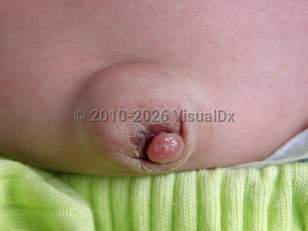Umbilical hernia in Infant/Neonate
Alerts and Notices
Important News & Links
Synopsis
This summary discusses pediatric patients. Umbilical hernias in adults are addressed separately.
An umbilical hernia is a common fascial defect of the anterior abdominal wall present at birth or within the first several months of life. Umbilical hernias are most common among premature infants and slightly more common in infants of African descent.
Failure of the ventral abdominal fascia to close properly allows a weak point that, during high-pressure environments such as Valsalva maneuvers or bowel movements, can cause protrusion of abdominal contents.
Ninety-five percent of umbilical hernias close spontaneously by age 5; however, strangulation of bowel or omentum is possible, and parents should be counseled on signs and symptoms. Strangulation of bowel can represent a medical emergency requiring surgical intervention.
An umbilical hernia is a common fascial defect of the anterior abdominal wall present at birth or within the first several months of life. Umbilical hernias are most common among premature infants and slightly more common in infants of African descent.
Failure of the ventral abdominal fascia to close properly allows a weak point that, during high-pressure environments such as Valsalva maneuvers or bowel movements, can cause protrusion of abdominal contents.
Ninety-five percent of umbilical hernias close spontaneously by age 5; however, strangulation of bowel or omentum is possible, and parents should be counseled on signs and symptoms. Strangulation of bowel can represent a medical emergency requiring surgical intervention.
Codes
ICD10CM:
K42.9 – Umbilical hernia without obstruction or gangrene
SNOMEDCT:
396347007 – Umbilical hernia
K42.9 – Umbilical hernia without obstruction or gangrene
SNOMEDCT:
396347007 – Umbilical hernia
Look For
Subscription Required
Diagnostic Pearls
Subscription Required
Differential Diagnosis & Pitfalls

To perform a comparison, select diagnoses from the classic differential
Subscription Required
Best Tests
Subscription Required
Management Pearls
Subscription Required
Therapy
Subscription Required
References
Subscription Required
Last Updated:03/24/2021
Umbilical hernia in Infant/Neonate

